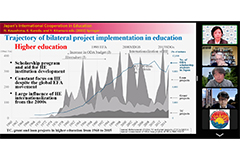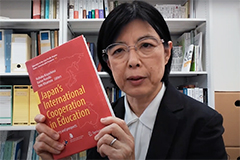Comparative and International Education Society (CIES) 2022 Conference Book Launch: ‘Japan’s International Cooperation in Education: History and Prospects’ Presented in English by Senior Research Advisor Kayashima Nobuko
2022.05.26
The Comparative and International Education Society (CIES), a world-renowned academic society in the field of education, held its 66th annual conference from April 18-22, 2022. During an online book launch on April 21, researchers involved in JICA Ogata Sadako Research Institute for Peace and Development (JICA Ogata Research Institute) project, “Japan’s International Cooperation in Education: History and Prospects” presented a book of the same title. The book, published in English in April 2022, is the core output of the project.
Editors Kayashima Nobuko (senior research advisor, JICA Ogata Research Institute), Kuroda Kazuo (visiting fellow, JICA Ogata Research Institute and professor, Waseda University) and Kitamura Yuto (professor, The University of Tokyo) introduced the book from their own unique perspectives, while Emeritus Professor Kenneth King of the University of Edinburgh, a renowned scholar in educational development, provided comments during the 90-minute session.

Editors introduced the book "Japan’s International Cooperation in Education: History and Prospects"
Kayashima presented an overview of the book’s scope and features, outlining the dual historical and empirical approach taken in analyzing Japan’s 70-year history of international cooperation in education. Kuroda examined Japan’s international educational cooperation policies against the backdrop of global trends in international cooperation such as Education for All, the Millennium Development Goals and the Sustainable Development Goals in his presentation “Evolution of Japan’s international education cooperation policy.” Kayashima then traced trends in educational cooperation in the fields of basic education, technical and vocational education and training (TVET) and higher education utilizing Japan’s official development assistance (ODA) budget data in her presentation “History of Japan’s project implementation in educational cooperation.” Finally, in his presentation “Japan’s role in the global governance of international education cooperation,” Kitamura discussed gaps in the ideal versus reality in partnerships with global governance organizations and future roles in educational cooperation for these organizations and Japan. King then commented on the session, introducing unique features of Japan’s international cooperation in education such as classroom research, science and mathematics education and school construction. The comprehensive examination of such features in a single volume from both historical and forward-looking perspectives is highly significant for the future of international cooperation in education, King asserted. Further, he discussed the potential for reciprocal educational cooperation relationships between Japan and emerging donor countries such as China and India as well as evolving partnerships with cooperation project counterparts in Africa and Asia.

Kayashima Nobuko, senior research advisor, JICA Ogata Research Institute
In the Q&A session, a wide range of topics were discussed including worldwide efforts to coordinate educational cooperation, positive influences of educational cooperation on Japanese education, the impact of COVID-19 on educational cooperation, increasing diversity and multiculturalism in Japan and cooperation in early childhood education. Further, JICA Ogata Research Institute Visiting Fellow and Sophia University Professor Sugimura Miki deepened the discussion with an explanation of international students and scholarships, the subject of her chapter in the book.

事業事前評価表(地球規模課題対応国際科学技術協力(SATREPS)).国際協力機構 地球環境部 . 防災第一チーム. 1.案件名.国 名: フィリピン共和国.

事業事前評価表(地球規模課題対応国際科学技術協力(SATREPS)).国際協力機構 地球環境部 . 防災第一チーム. 1.案件名.国 名: フィリピン共和国.

事業事前評価表(地球規模課題対応国際科学技術協力(SATREPS)).国際協力機構 地球環境部 . 防災第一チーム. 1.案件名.国 名: フィリピン共和国.

事業事前評価表(地球規模課題対応国際科学技術協力(SATREPS)).国際協力機構 地球環境部 . 防災第一チーム. 1.案件名.国 名: フィリピン共和国.

事業事前評価表(地球規模課題対応国際科学技術協力(SATREPS)).国際協力機構 地球環境部 . 防災第一チーム. 1.案件名.国 名: フィリピン共和国.
scroll